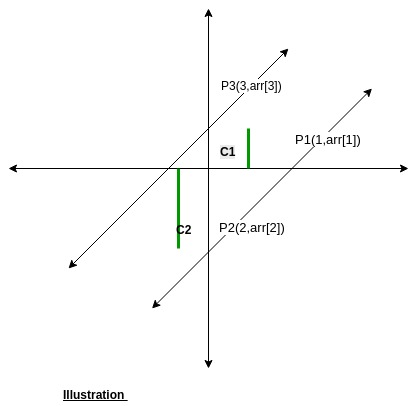给定一个数组,该数组表示坐标平面上一组点的y坐标,其中(i,arr [i])表示单个点。查找是否有可能绘制一对平行线,其中包括给定的所有坐标点,并且两条线都必须包含一个点。如果可能,打印1 ,如果可能,打印0 。
例子:
Input: arr[] = {1, 4, 3, 6, 5};
Output: 1
(1, 1), (3, 3) and (5, 5) lie on one line
where as (2, 4) and (4, 6) lie on another line.
Input: arr[] = {2, 4, 3, 6, 5};
Output: 0
Minimum 3 lines needed to cover all points.
方法:由纵轴(x1,y1)和(x2,y2)构成的直线的斜率是y2-y2 / x2-x1。由于给定的数组由(i,arr [i])的点的坐标组成。因此,(arr [2] -arr [1])/(2-1)是由(1,arr [i])和(2,arr [2])构成的线的斜率。仅考虑三个点,例如P0(0,arr [0]),P1(1,arr [1])和P2(2,arr [2]),因为要求只有两条平行线,这是强制性的这三个点中的两个位于同一条线上。因此,三种可能的情况是:
- P0和P1在同一行上,因此它们的斜率将为arr [1] -arr [0]
- P1和P2在同一行上,因此它们的斜率将为arr [2] -arr [1]
- P0和P2在同一行上,因此它们的斜率将为arr [2] -arr [0] / 2
取三分之二的条件说P0和P1位于同一条线上,在这种情况下,令m = arr [1] -arr [0]是我们的斜率。对于数组(i,arr [i])中的一个一般点,线的方程为:
=> (y-y1) = m (x-x1)
=> y-arr[i] = m (x-i)
=> y-mx = arr[i] - mi
现在,由于y-mx = c是直线的一般方程,这里c = arr [i] -mi。现在,如果解决方案对于给定的数组是可行的,那么我们必须有精确的两个截距(c)。
因此,如果上述三个可能的任何一个存在两个截然不同的截距,则所需的解决方案是可能的,并打印1或0。

下面是上述方法的实现:
C++
// C++ implementation of the above approach
#include
using namespace std;
// Find if slope is good with only two intercept
bool isSlopeGood(double slope, int arr[], int n)
{
set setOfLines;
for (int i = 0; i < n; i++)
setOfLines.insert(arr[i] - slope * (i));
// if set of lines have only two distinct intercept
return setOfLines.size() == 2;
}
// Function to check if required solution exist
bool checkForParallel(int arr[], int n)
{
// check the result by processing
// the slope by starting three points
bool slope1 = isSlopeGood(arr[1] - arr[0], arr, n);
bool slope2 = isSlopeGood(arr[2] - arr[1], arr, n);
bool slope3 = isSlopeGood((arr[2] - arr[0]) / 2, arr, n);
return (slope1 || slope2 || slope3);
}
// Driver code
int main()
{
int arr[] = { 1, 6, 3, 8, 5 };
int n = sizeof(arr) / sizeof(arr[0]);
cout << (int)checkForParallel(arr, n);
return 0;
} Java
// Java implementation of the above approach
import java.util.*;
class GfG
{
// Find if slope is good
// with only two intercept
static boolean isSlopeGood(double slope,
int arr[], int n)
{
Set setOfLines = new HashSet ();
for (int i = 0; i < n; i++)
setOfLines.add(arr[i] - slope * (i));
// if set of lines have only two distinct intercept
return setOfLines.size() == 2;
}
// Function to check if required solution exist
static boolean checkForParallel(int arr[], int n)
{
// check the result by processing
// the slope by starting three points
boolean slope1 = isSlopeGood(arr[1] - arr[0], arr, n);
boolean slope2 = isSlopeGood(arr[2] - arr[1], arr, n);
boolean slope3 = isSlopeGood((arr[2] - arr[0]) / 2, arr, n);
return (slope1 == true || slope2 == true || slope3 == true);
}
// Driver code
public static void main(String[] args)
{
int arr[] = { 1, 6, 3, 8, 5 };
int n = arr.length;
if(checkForParallel(arr, n) == true)
System.out.println("1");
else
System.out.println("0");
}
}
// This code is contributed by Prerna Saini. Python3
# Python3 implementation of the
# above approach
# Find if slope is good with only
# two intercept
def isSlopeGood(slope, arr, n):
setOfLines = dict()
for i in range(n):
setOfLines[arr[i] - slope * (i)] = 1
# if set of lines have only
# two distinct intercept
return len(setOfLines) == 2
# Function to check if required solution exist
def checkForParallel(arr, n):
# check the result by processing
# the slope by starting three points
slope1 = isSlopeGood(arr[1] - arr[0], arr, n)
slope2 = isSlopeGood(arr[2] - arr[1], arr, n)
slope3 = isSlopeGood((arr[2] - arr[0]) // 2, arr, n)
return (slope1 or slope2 or slope3)
# Driver code
arr = [1, 6, 3, 8, 5 ]
n = len(arr)
if checkForParallel(arr, n):
print(1)
else:
print(0)
# This code is contributed by Mohit KumarC#
// C# implementation of the above approach
using System;
using System.Collections.Generic;
class GfG
{
// Find if slope is good
// with only two intercept
static bool isSlopeGood(double slope,
int []arr, int n)
{
HashSet setOfLines = new HashSet ();
for (int i = 0; i < n; i++)
setOfLines.Add(arr[i] - slope * (i));
// if set of lines have only two distinct intercept
return setOfLines.Count == 2;
}
// Function to check if required solution exist
static bool checkForParallel(int []arr, int n)
{
// check the result by processing
// the slope by starting three points
bool slope1 = isSlopeGood(arr[1] - arr[0], arr, n);
bool slope2 = isSlopeGood(arr[2] - arr[1], arr, n);
bool slope3 = isSlopeGood((arr[2] - arr[0]) / 2, arr, n);
return (slope1 == true || slope2 == true || slope3 == true);
}
// Driver code
public static void Main()
{
int []arr = { 1, 6, 3, 8, 5 };
int n = arr.Length;
if(checkForParallel(arr, n) == true)
Console.WriteLine("1");
else
Console.WriteLine("0");
}
}
// This code is contributed by Ryuga. PHP
1